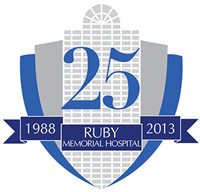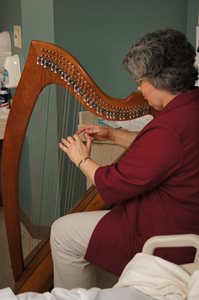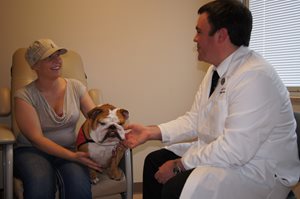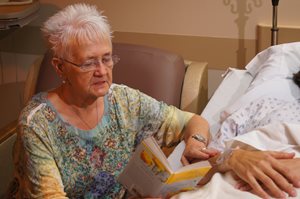Ruby Memorial Hospital offers programs for treating the whole person
MORGANTOWN, W.Va. – When considering the sights and sounds of a hospital, most people pro bably recall familiar IV poles and beeping monitors. But within Ruby Memorial Hospital, patients and visitors can also find relaxation from a soothing melody, comfort from a furry friend or strength from praying hands.
bably recall familiar IV poles and beeping monitors. But within Ruby Memorial Hospital, patients and visitors can also find relaxation from a soothing melody, comfort from a furry friend or strength from praying hands.
In addition to caring for patients’ physical ailments, Ruby Memorial Hospital offers programs that help in treating the whole person, including their emotional and spiritual wellness. Therapeutic music, pet therapy and spiritual care provide patients with uplifting distractions from their medical condition.
Certified Music Practitioner Cindy Lewellen serves as a volunteer at Ruby, wheeling her harp throughout the building and offering patients a chance to hear therapeutic music. She frequently plays her harp in WVU Children’s Hospital’s Neonatal Intensive Care Unit, waiting areas and individual patient rooms.

“I take it as a compliment when a patient falls asleep,” she said. “I get to make a difference in people’s lives with my music. I am much more comfortable providing music as a service than music as a performance.”
Lewellen explained her live, acoustic music, which is tailored to each patient’s specific situation, can benefit anyone who is able to hear or feel the vibration of sound.
“Patients in a coma, women in labor, infants and preemies, hospice patients, patients with severe burns and other patients for whom it is painful or impossible to move can all benefit from music at the bedside,” Lewellen noted. “Therapeutic music also provides comfort for grieving family members.”
Pet therapy offers another avenue for patients to feel comfort and companionship during a hospital stay. In addition to his role as a physician, Hematology/Oncology Fellow Brendan Curley, D.O., serves as a volunteer with his therapy dog, Princess Danger. Patients enjoy watching her perform tricks, such as rolling over and giving “five.” Pet therapy can help most patients, ranging from outpatients receiving chemotherapy infusions to critically ill patients on ventilators.
Morgantown resident Devon Velasquez, a cancer patient, recently met Princess Danger during an appointment at the Mary Babb Randolph Cancer Center. A dog lover, Velasquez has a 140-pound Rottweiler named Keno at home.

“When I’m here receiving treatment, I always have at least one person here to support me, but I see a lot of people who don’t have anybody with them,” Velasquez said. “For those people, I think pet therapy could definitely be a help.”
Dr. Curley noted pet therapy benefits patients by distracting them and offering them companionship.
“Pet therapy is a very nice supplement to everything that we do to help patients,” he said. “It can give them a little piece of home that they’ve been missing. Maybe my dog is not the same as their dog. The therapy dog they’re seeing is a little bit different, but at the same time, it’s something that you typically don’t get in a hospital. It’s something that helps you think about what your future holds – you get to go home soon and see your dog.”
WVU Healthcare's Spiritual Care Department includes board-certified, full-time chaplains, full-time chaplain residents and part-time training chaplains. They receive referrals from physicians, nurses, physical therapists, housekeepers, dietary assistants and other hospital employees for patients who seem to need spiritual or emotional healing.
“As we hear the patient’s story, we find out what the various needs may be,” John Hardman, WVU Healthcare director of spiritual care, said. “As the story unfolds and the needs become apparent, that’s what we try to address. We have to be able to think on our feet every time we go into a room. We have to pay close attention and be good listeners.”

Treating all patients with respect and dignity is a key part of what the Spiritual Care Department does at Ruby, and the No One Dies Alone (NODA) program, which Hardman also oversees, is an extension of that philosophy.
“Every individual is a person of worth and value and deserves the dignity of having a friendly face in the room at the time of death,” he added. “That’s what we provide.”
The volunteer-based program started in January 2012 and grew out of a need Hardman and his staff saw. “We began to recognize that we had patients who were dying and had no one with them for a variety of reasons. Sometimes people just outlive everybody. Sometimes the only family they have is so far away, they can’t get here.”
NODA volunteers, who are recruited through the WVU Healthcare Volunteer Services Office, participate in training to prepare them for what they might see as a person dies. “We also train them on what they can do during that process,” Hardman noted. “Volunteers can hold their hand, read the newspaper, stroke their hair, read poetry, read from the Bible, play music or moisten their lips.”
WVU Stroke Center Nurse Practitioner Martha Power regularly volunteers with NODA and views her service with the program as a continuation of being a nurse.
“I always feel as though I cannot spend as much time with the patient as I want to,” she noted. “I am happy to know I’ve helped someone and that person’s family, who can’t be there. I do it for the patient, but the good feeling it gives me to help others is a bonus.”
WVU Healthcare’s flagship hospital, Ruby Memorial, is celebrating its 25th anniversary. It opened on July 19, 1988, after a generous donation from Morgantown philanthropist Hazel Ruby McQuain. The anniversary celebration will continue through the fall, marking a quarter century of care for tens of thousands of patients.
Photo captions (top to bottom):
Certified Music Practitioner Cindy Lewellen plays her harp in a patient room at Ruby Memorial Hospital.
Hematology/Oncology Fellow Brendan Curley, D.O., introduces his therapy dog Princess Danger to patient Devon Velasquez during an appointment at the Mary Babb Randolph Cancer Center.
No One Dies Alone volunteer Sharon Vincent reads poetry to a patient.
 bably recall familiar IV poles and beeping monitors. But within Ruby Memorial Hospital, patients and visitors can also find relaxation from a soothing melody, comfort from a furry friend or strength from praying hands.
bably recall familiar IV poles and beeping monitors. But within Ruby Memorial Hospital, patients and visitors can also find relaxation from a soothing melody, comfort from a furry friend or strength from praying hands.In addition to caring for patients’ physical ailments, Ruby Memorial Hospital offers programs that help in treating the whole person, including their emotional and spiritual wellness. Therapeutic music, pet therapy and spiritual care provide patients with uplifting distractions from their medical condition.
Certified Music Practitioner Cindy Lewellen serves as a volunteer at Ruby, wheeling her harp throughout the building and offering patients a chance to hear therapeutic music. She frequently plays her harp in WVU Children’s Hospital’s Neonatal Intensive Care Unit, waiting areas and individual patient rooms.
“I take it as a compliment when a patient falls asleep,” she said. “I get to make a difference in people’s lives with my music. I am much more comfortable providing music as a service than music as a performance.”
Lewellen explained her live, acoustic music, which is tailored to each patient’s specific situation, can benefit anyone who is able to hear or feel the vibration of sound.
“Patients in a coma, women in labor, infants and preemies, hospice patients, patients with severe burns and other patients for whom it is painful or impossible to move can all benefit from music at the bedside,” Lewellen noted. “Therapeutic music also provides comfort for grieving family members.”
Pet therapy offers another avenue for patients to feel comfort and companionship during a hospital stay. In addition to his role as a physician, Hematology/Oncology Fellow Brendan Curley, D.O., serves as a volunteer with his therapy dog, Princess Danger. Patients enjoy watching her perform tricks, such as rolling over and giving “five.” Pet therapy can help most patients, ranging from outpatients receiving chemotherapy infusions to critically ill patients on ventilators.
Morgantown resident Devon Velasquez, a cancer patient, recently met Princess Danger during an appointment at the Mary Babb Randolph Cancer Center. A dog lover, Velasquez has a 140-pound Rottweiler named Keno at home.
“When I’m here receiving treatment, I always have at least one person here to support me, but I see a lot of people who don’t have anybody with them,” Velasquez said. “For those people, I think pet therapy could definitely be a help.”
Dr. Curley noted pet therapy benefits patients by distracting them and offering them companionship.
“Pet therapy is a very nice supplement to everything that we do to help patients,” he said. “It can give them a little piece of home that they’ve been missing. Maybe my dog is not the same as their dog. The therapy dog they’re seeing is a little bit different, but at the same time, it’s something that you typically don’t get in a hospital. It’s something that helps you think about what your future holds – you get to go home soon and see your dog.”
WVU Healthcare's Spiritual Care Department includes board-certified, full-time chaplains, full-time chaplain residents and part-time training chaplains. They receive referrals from physicians, nurses, physical therapists, housekeepers, dietary assistants and other hospital employees for patients who seem to need spiritual or emotional healing.
“As we hear the patient’s story, we find out what the various needs may be,” John Hardman, WVU Healthcare director of spiritual care, said. “As the story unfolds and the needs become apparent, that’s what we try to address. We have to be able to think on our feet every time we go into a room. We have to pay close attention and be good listeners.”
Treating all patients with respect and dignity is a key part of what the Spiritual Care Department does at Ruby, and the No One Dies Alone (NODA) program, which Hardman also oversees, is an extension of that philosophy.
“Every individual is a person of worth and value and deserves the dignity of having a friendly face in the room at the time of death,” he added. “That’s what we provide.”
The volunteer-based program started in January 2012 and grew out of a need Hardman and his staff saw. “We began to recognize that we had patients who were dying and had no one with them for a variety of reasons. Sometimes people just outlive everybody. Sometimes the only family they have is so far away, they can’t get here.”
NODA volunteers, who are recruited through the WVU Healthcare Volunteer Services Office, participate in training to prepare them for what they might see as a person dies. “We also train them on what they can do during that process,” Hardman noted. “Volunteers can hold their hand, read the newspaper, stroke their hair, read poetry, read from the Bible, play music or moisten their lips.”
WVU Stroke Center Nurse Practitioner Martha Power regularly volunteers with NODA and views her service with the program as a continuation of being a nurse.
“I always feel as though I cannot spend as much time with the patient as I want to,” she noted. “I am happy to know I’ve helped someone and that person’s family, who can’t be there. I do it for the patient, but the good feeling it gives me to help others is a bonus.”
WVU Healthcare’s flagship hospital, Ruby Memorial, is celebrating its 25th anniversary. It opened on July 19, 1988, after a generous donation from Morgantown philanthropist Hazel Ruby McQuain. The anniversary celebration will continue through the fall, marking a quarter century of care for tens of thousands of patients.
Photo captions (top to bottom):
Certified Music Practitioner Cindy Lewellen plays her harp in a patient room at Ruby Memorial Hospital.
Hematology/Oncology Fellow Brendan Curley, D.O., introduces his therapy dog Princess Danger to patient Devon Velasquez during an appointment at the Mary Babb Randolph Cancer Center.
No One Dies Alone volunteer Sharon Vincent reads poetry to a patient.